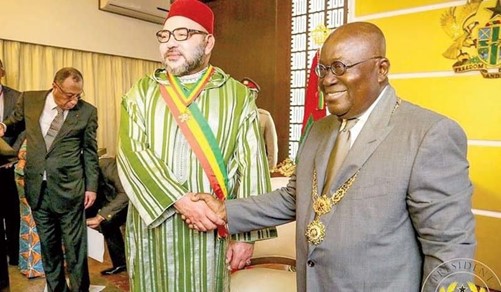Morocco celebrated the 25th anniversary of the enthronement of King Mohammed VI on 30 July 2024. Economic growth, reforms and development projects have been at the heart of recent decades marked by evolution and progress.
The reign of Mohammed VI has seen the promotion of numerous social reforms, such as the National Initiative for Human Development (INDH), the Mohammed V Foundation for Solidarity, the Compensation Fund, the Medical Assistance Scheme (RAMED) and the establishment of direct aid in exceptional periods, particularly during the Covid-19 pandemic.
To mark the anniversary celebration, I had the opportunity to interact with the Ambassador of Morocco to Ghana, Imane Ouaadil, on the role of His Majesty in promoting Morocco around the world and the wellbeing of Moroccans.
Question: Great to be meeting you today Your Excellency, let me take this opportunity to congratulate His Majesty King Mohammed VI on the occasion of his 25th anniversary.
Answer: Thank you. Indeed, Morocco celebrated Tuesday, July 30, 2024, the 25th anniversary of the accession of His Majesty King Mohammed VI to the Throne of His glorious ancestors. The commemoration of this national day is an opportunity to renew the secular bonds of the Allegiance and to express the unwavering attachment of Moroccans to the Alawite Throne, and their commitment of the King and the people to meet challenges together and overcome all difficulties.
The celebration of the Throne this year is intended to illustrate this strong aspiration to achieve more victories for the Nation and an opportunity to reflect on the many achievements and successes realized during the last 25 years under the Reign of His Majesty and to further mobilize in favor of the improvement of Morocco towards progress and modernity.
Question: His Majesty has been a great pillar in the drive for a united and prosperous Africa, visiting several countries and promoting cooperation. What is the mission of His Majesty?
Answer: Since independence, the spirit of the Casablanca Group has underpinned Morocco’s commitment to a peaceful and prosperous Africa. Morocco has promoted South-South cooperation, fostered peace and stability, advocated for greater regional integration, and developed mutually beneficial economic partnerships. King Mohammed VI has personally defined Morocco’s Africa policy, as evidenced by his 50 state visits to 32 African countries in 20 years.
During His Majesty’s reign, Morocco has become the second largest African investor in Sub-Saharan Africa and the largest African investor in West Africa. A significant portion of Moroccan foreign direct investment (FDI), 62.9percent, is directed to sub-Saharan Africa, spanning sectors such as banking (31percent), telecommunications (21percent), industry (12percent), real estate (11percent), holdings (10percent), other services (9percent), trade (5percent), and insurance (1percent).
Moroccan enterprises operating in 30 African countries have fostered a conducive ecosystem for growth. Moroccan banks, including Bank of Africa and Attijariwafabank, contribute to development by extending up to USD 100 million in credit loans to government-funded projects and local small and medium enterprises.
Morocco has consistently advocated for deeper political and economic regional integration. In 1989, it hosted the summit that established the Arab Maghreb Union in Marrakech. A decade later, Morocco became a member of the Community of Sahelo-Saharan States (CENSAD). In 2016, it formally requested to join ECOWAS, and in 2019, it ratified the African Continental Free Trade Agreement.
Having developed modern infrastructures such as the largest port in Africa (Tanger Med port), the world’s largest solar plant (Noor), the first high-speed bullet train on the continent and in the MENA region, Morocco’s current focus is on the development of regionally integrated infrastructure projects.
In this vein, Morocco and Nigeria agreed to undertake the US$20 billion Atlantic African Gas Pipeline Project, aimed at transporting gas from West Africa to Europe. Morocco is also collaborating with G5 Sahel countries to assist in the development of solar green energy.
Besides, Morocco has a long-standing tradition of investing in Africa’s youth dating back to the 1980s. Each year, over 7,000 students from several sub-Saharan African countries enroll in universities in Morocco, benefiting from scholarships. Additionally, hundreds of sub-Saharan African professionals receive vocational training in Morocco’s ‘centers of excellence’, leveraging Morocco’s experience and know-how.
As a major agricultural producer, Morocco has directed a significant portion of its investments in Africa to the agricultural sector, assisting African countries in the transformation and modernization of their agriculture. The OCP group, Morocco’s phosphates and fertilizer producer, has provided soil mapping and shared best practices, expertise, and advice with various countries in West Africa, the Sahel, and East Africa.
In 2023, the OCP partnered with the World Bank to foster cooperation and programs benefiting 5 million farmers in Benin, Guinea, Mali, and Togo, covering 10 million hectares. This new partnership will unlock opportunities for African farmers to improve agricultural productivity and soil health through the use of customized fertilizers and sustainable farming practices.
Last but not least The Atlantic Initiative, launched by His Majesty King Mohammed VI to facilitate access for Sahel States to the Atlantic Ocean, stands as a distinctive framework aimed at fostering multidimensional African cooperation, ultimately paving the way for the emergence of a new, prosperous and stable Africa. This ambitious plan will end the isolation of Sahelian countries such as Burkina Faso, Niger, Chad and Mali by opening their doors to the Atlantic Ocean, something that will undoubtedly bring numerous economic benefits to these nations.
Question: On this symbolic anniversary, what is the special message of His Majesty?
Answer: His Majesty’s messages have always been calls for peace, cooperation and appeals for regional and continental integrity to achieve the common goals of prosperity and development for the people of Africa. They are calls for unity and pragmatism to advance win-win cooperation and fulfill enduring stability and peace for each and every one of the 54 African countries.










